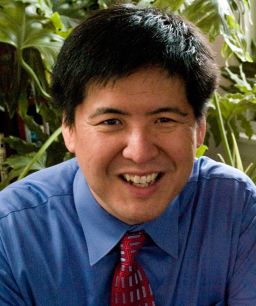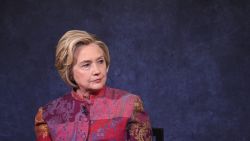Editor’s Note: Sam Wang and Julian Zelizer are co-hosts of the podcast, “Politics & Polls.” Wang is a professor of neuroscience at Princeton University and a founder of the Princeton Election Consortium. Zelizer is a professor of history and public affairs at Princeton University and a New America fellow. He is the author of “Jimmy Carter” and “The Fierce Urgency of Now: Lyndon Johnson, Congress, and the Battle for the Great Society.” The opinions expressed in this commentary are theirs.
Story highlights
In the final days of the presidential campaign, two Princeton professors hash out the story behind the polls and the news headlines
Sam Wang of Princeton Election Consortium: There's been very little variation in polls that show Clinton with a narrow popular and electoral vote edge
As the election ticks down to the final hours, supporters of Hillary Clinton and Donald Trump are nervously eying the latest polls, watching as their candidates crisscross the country, and trying to figure out who has the edge in what could be a very tight race. Princeton professors Sam Wang and Julian Zelizer, co-hosts of a podcast called “Politics & Polls,” had the following email exchange about the final days of the campaign:
Julian Zelizer: Every Democrat I speak to is really nervous about this election. They tell me, “I know what Sam says,” but it really seems like the polls have tightened. How are you so calm?
Sam Wang: Yeah, both Democrats and Republicans are really worked up. In my own mind I try to separate the drama from the data. Early this season, I noticed that no matter what happened, opinion didn’t move that much. The race has shown less variation than ever in the history of presidential polling. It made me realize that the race probably wasn’t going anywhere. But when was the last time a presidential race was this emotional?

Zelizer: It’s funny, I think about that often. Sometimes we are really nostalgic and forget how emotional people become around elections. Even though this is a cynical age, with trust in institutions declining steadily since the 1960s, people still really get caught up in the democratic choice. I remember being in a hotel in Virginia after the election in 2004 with some people who were clearly liberals and profoundly upset by the outcome, moving-out-of-the-country kind of upset. I suspect there were conservatives who felt that way in 2012. What keeps getting to me is just the ongoing flood of surprises, twists and turns. It’s not the just the emotions about the candidates but the ongoing swings in the news, like the James Comey letter on Hillary Clinton’s emails.

Wang: Wait, so what distinguishes normal emotion from full meltdown? Come on, this year is different. The GOP nominee has never held office, he’s basically a reality TV star, and the following organizations have come out against him: Scientific American, Nature (another scientific journal), Skittles, and Tic Tacs. Tic Tacs? This year feels like a culmination of trends that started in the mid-1990s. Newt Gingrich and his associates wanted to remake their party and government, and those seeds they planted have come to full flower.
Views on Election 2016
Zelizer: Emotion is different than meltdown. 1968 was really emotional – there were activists clashing on the streets with the police! Unconventional – that is a different story. I can’t think of a candidate like Trump. My normal “it’s happened before response” definitely doesn’t work. There is Trump himself and the party that produced Trump. The latter are long-running trends. I’m really interested though in how you are finding in the polls that there has been more stability in this race that many people realize, and in that respect it’s not so different than other election years. That still true?
Wang: Amazingly, yes. After aggregating polls to get rid of variation that does not reflect real changes in opinion, the end result is that the national margin between Clinton and Trump has stayed within a five-point range, from Clinton ahead by two to seven points. That’s about the smallest range that has ever been measured. I see it as a testament to the inflexibility of voters.
Zelizer: A close presidential result would mean that regardless of outcome a lot of Republicans might feel OK about the party even after the turmoil.
Wang: For example, consider the House. If polarization is the strongest force, then the Republican caucus will find someone to unify around, maybe not Paul Ryan. But if the Freedom Caucus can’t come to terms with those who want to govern, that’s a serious division. My first guess is they find a way to unify. But then what?
Zelizer: Investigation. The last week pretty much set up what the opening theme of a Republican House would be with Clinton as president. They will unify on that and if someone like Jim Jordan is speaker, the budget wars will start right up. Paul Ryan could still hang on, though; let’s remember, his ideology is very much to the right and he’s still one of best national spokesmen for the GOP.
Zelizer: What’s going on in Florida and Nevada, where polls show gains for Trump? It can’t just be things like the email story, so what’s going on there?
Wang: Those are states with close Senate races. There’s a ton of local advertising, and Florida has half a dozen close House races because of fair-districting amendments to the state constitution. There could be all kinds of factors aside from Clinton’s email hygiene.
Wang: A relatively untold story of this campaign is the extent to which 2016 is the year that Republicans finally harvested the fruits of their aggressive gerrymandering after the 2010 Census. Based on my calculations, it gave them a 10- to 15-seat cushion in the House, which will probably protect them from losing control of the chamber.
Wang: I’m terrible at gaming out specific electoral scenarios, since my calculations consider all possibilities at once. Clinton is effectively ahead in the Electoral College by 3%, which means she’d have to lose that much across the board for Trump to have even odds of winning. That doesn’t sound like a lot, but the race hasn’t gotten to that point all year. It is doubtful that it will happen in the closing days.
Zelizer: I can’t do predictions. Historians just do context and broad analysis – why something happened, what was happening and what to take from it. We can duck the prediction business!
Wang: But that’s essential! I view poll analysis, properly done, as being like a thermometer or other scientific instrument. It tells you conditions at any given moment – but to understand long-term change, a story line is needed. It would be better if we had more history and less horse race in news coverage.
Zelizer: That’s a fair point. Sometimes, though, I think horse race coverage does get us into some of the internal dynamics of a campaign and also tells us something about the issues and sentiment in the electorate.
Wang: I agree with that. I’ve seen some great work trying to get at where Trump voters come from, and the wing of the GOP they represent. This was the year that whites became an interest group and not the overwhelming group by default. And it is the details of polls that told us about it.
Zelizer: Is there any single poll that could come out that would cause concern for you about the overall analysis of public opinion? I am always impressed how you have such nerves of steel on the predictions. Did they teach that in grad school?
Wang: As a scientist, my instinct is: It’s the same way with polls. There is no single poll that would make me pause. But let’s say Pennsylvania or Michigan came up with three presidential polls, each with Trump ahead. That would suggest that I had missed something. Considering where the race is, I’m more interested in surprises in Senate races. If Indiana goes Republican, or if Missouri goes Democratic, those would be upsets with significant implications for Senate control (Of course, they could cancel one another!). I would have thought a historian would have nerves of steel too – you know, seen it all before?
Get our free weekly newsletter
Zelizer: That’s a good point. I do, but history also shows there are these moments of big and unanticipated change when politics moves in really new directions. Ronald Reagan seems logical in hindsight, but not from the perspective of the 1970s. Polarization today though is so powerful I think it serves as something of a check to big electoral swings. Though I guess we will see soon.
Wang: I see Trump that way. The Republican party’s embrace of extreme approaches and demonizing the opposition started in the 1990s, and it’s a straight line from then to now. Many observers and pundits seem not to have noticed. This year, the Trump nomination is just the chickens coming home to roost.
Zelizer: Agreed, Sam. He didn’t reinvent the party – the party changed itself, and here we are.
Zelizer: What about Utah and Georgia? Has the GOP stabilized there?
Wang: I don’t see Trump losing either of those states, but I could be surprised. Evan McMullin certainly has legs that I wasn’t expecting. I wonder how Republican those two states will lean in 2020 … maybe less so.
Zelizer: Clinton is campaigning in Michigan? Is an upset possible there?
Wang: Probably not, but her going there is good resource allocation.
Zelizer: Ron Brownstein made the point that HRC invested heavily in battleground states, but paid very little attention to places like Michigan that seemed a lock. Given Trump’s strong appeal right now to blue collar workers, that might have been a strategic mistake.

























